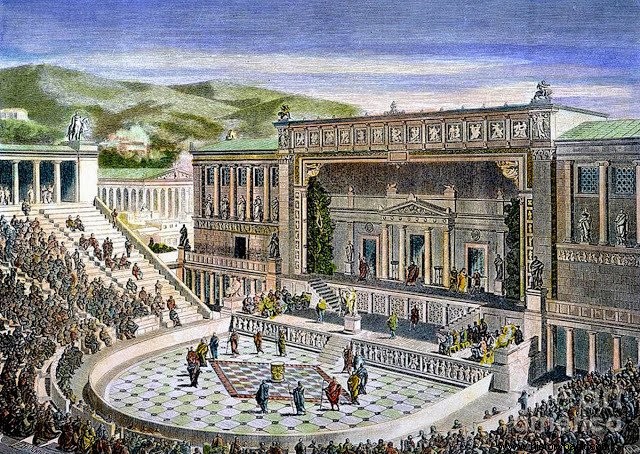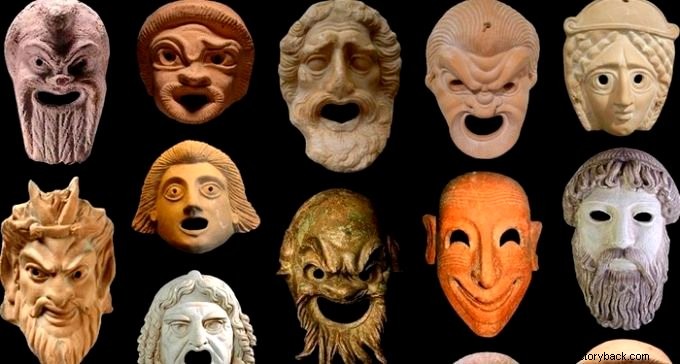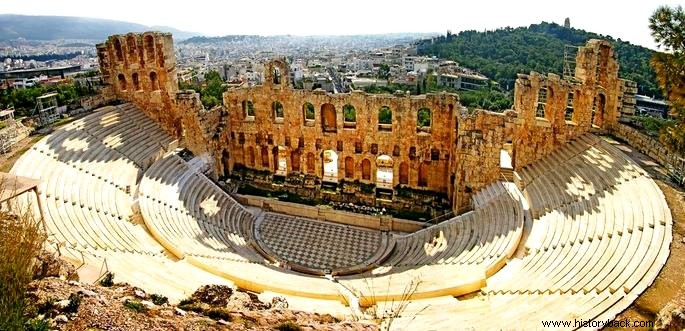The Greek Theater It was a very important artistic manifestation in the development of Greek culture. In addition, it served as an influence and inspiration for other peoples of antiquity, especially the Romans.
It is worth remembering that the term theater (theater ), from the Greek, means “place where you can see” or “place to look”.
The Greek theater was formed by several elements, sets and costumes. In addition to the presence of juries, they performed songs, dances and mimes.
For the Greeks, going to the theater represented a great event, which gradually took over the social life of the inhabitants.

Origin of Greek Theater
Greek theater began in Athens, Greece, around 550 BC. and emerged from the celebrations held mainly for the God Dionysus.
This was a deity from Greek mythology related to festivals, fertility and wine.
In the Dionysian celebrations, which lasted about a week, people drank, sang and danced.
Over time, the festivities evolved in terms of organization and elaboration, reaching what we now know as theater with a plot, actors, audience, staging, etc.
It is said that the first man to perform a staging was called Thespis . He is considered the first actor and theatrical producer in the West.
Numerous theater festivals were part of Ancient Greece and were performed throughout the day and many lasted several days.
See also:Greek MythologyGreek masks

Masks were essential tools in actors' costumes, being widely used in Greek theater.
Women did not participate in the performances, as they were not considered citizens. In this way, the masks, previously used as ritualistic artifacts, could represent characters of both sexes.
See also:Ancient GreeceArchitecture of Greek Theater

The architecture of Greek theaters had as a striking feature the open-air buildings, called arena theaters.
In the shape of a crescent, for better acoustics, they had a large bleacher for the audience.
In classical times, several theaters were built in Greece. Worthy of mention are the Theater of Delphi and the Theater of Dionysus.
See also:Greek ArchitectureTheatre genres in Ancient Greece
Greek Tragedy
From the Greek, the term tragedy (tragoedia ) is formed by the words, “tragos ” (goat) and “oidé ”, (song).
Its meaning is “song to the goat”, because in the celebrations to Dionysus (Song to the Goat), a goat was sacrificed as an offering and, in addition, men dressed as satyrs.
It is the oldest theatrical genre of all, which was based on tragic and mythological stories, such as fear, death, terror.
That is, tragedy is an artistic genre that represents a play (or poem) with an unhappy ending.
Greek tragedies were usually composed of five acts. One of the important features that set it apart from comedy was the characters.
Thus, in tragedy the characters were gods, kings and heroes, while in comedy they were common men.
The most important Greek dramatists of this genre were:Aeschylus, Sophocles and Euripides.
It is worth remembering that, unlike the jurors in the Comedies, the juries of the tragedies were formed by five important people of the aristocracy.
See also:Greek tragedyGreek Comedy
From the Greek, the term comedy (komoidia ), meant a “fun show”.
It is, therefore, a critical theatrical genre based on satire, and which approached various aspects of Greek society in a comical way.
It is worth remembering that it was considered by the classics as a minor genre in relation to tragedy.
Comedy juries were not aristocrats, as in tragedy. That way, they were made up of three people from the audience.
For the Greek philosopher Aristotle, tragedy was a major genre, representing "higher" men. Comedy, on the other hand, represented everyday events and, therefore, was presented by "inferior" men, that is, citizens of the Polis.
Among the playwrights of this genre, Aristophanes stands out.
See also:Greek comedyGreek plays
Many Greek plays are performed to this day because of the influence they had on the world. They are:
- Oedipus the King , by Sophocles
- Prometheus Bound , by Aeschylus
- The Trojans , by Euripides
- The Wasps , by Aristophanes
Roman Theater
The Roman theater, as well as the entire culture of Ancient Rome, was greatly influenced by the Greek theater, also developing in the classical period.
Likewise, the theater of Rome played an important role in society, which influenced the politics and beliefs of the population.
Among the Roman playwrights, Plautus, Terence and Menander stand out.
See also:Classic PeriodCuriosity about the Theater

The mask of Tragedy and Comedy are very widespread elements in the theater and refer to their origin and the main genres in Ancient Greece.
They are used as a symbol of the performing arts.
You may also be interested :
- History of Theater:origin and evolution over time
- Greek Art
